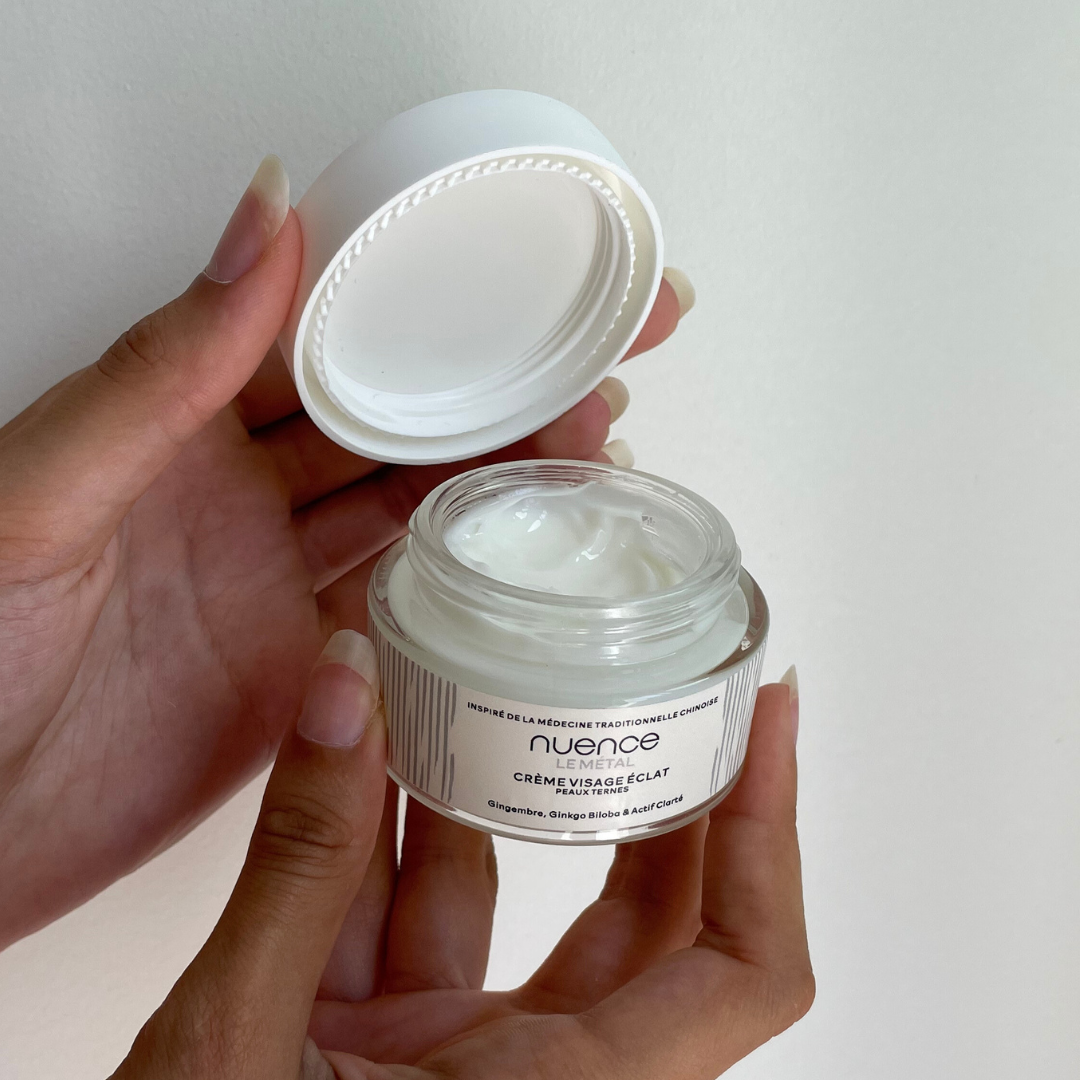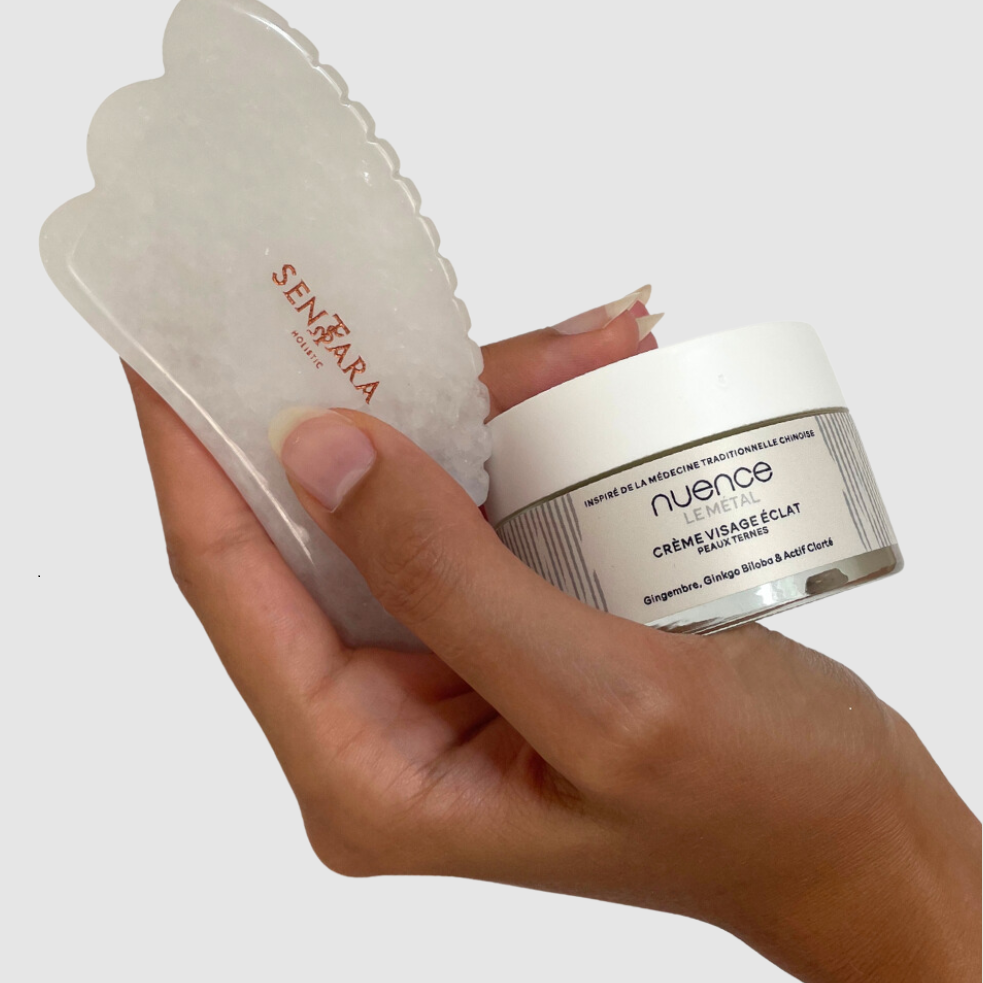In this article, the NUENCE team provides you with the main principles of Chinese dietetics and how a healthy and balanced diet can have a real impact on the beauty and youthfulness of your skin.
The main principles of Chinese dietetics
Dietetics is an essential component of traditional Chinese medicine (TCM). This ancestral and holistic practice is based on thousands of years of knowledge and practice. The first references to Chinese dietetics date back more than 2000 years, in texts which describe its fundamental principles. Today, it is very present in the daily life of Chinese families and is an integral part of their culture. This discipline is very vast and will be the subject of other articles in our blog. Here is a short summary that NUENCE has prepared to understand the main principles:
- Preventive and individualized dietetics : Like other TCM disciplines, it is oriented towards prevention. Food choices are adjusted according to individual needs. It is therefore a preventive and individualized diet which adapts to the constitution and temperament of each individual but also to the climate and the seasons in order to maintain harmony, health and general well-being.
- Energy balance : It is based on the principles of energy balance and strives to maintain it, particularly that between cold and hot foods. Indeed, foods are classified according to their energy temperature: cold, fresh, neutral, lukewarm or hot. It is good to note that we are not talking about whether the food is hot or cold but rather about the nature of the food (strong spices are hot foods). Another example, in autumn and winter, we avoid raw vegetables which “cool” the body.
- Local and seasonal foods : Chinese dietetics encourages the consumption of fresh, seasonal and local foods. Foods grown in their natural environment and harvested when ripe are considered to be more beneficial to health. Consuming local and seasonal is an environmentally friendly practice which, in traditional Chinese medicine, is a fundamental notion.
- A reduction in raw, cold or frozen foods: According to Chinese dietetics, excessive consumption of raw, cold or frozen foods can weaken digestion and the body's vital energy. These foods will lead to additional energy spent by the Spleen and Kidneys to assimilate them and thus lead to imbalances. It is recommended to favor cooked, hot or warm foods, which are easier to digest and promote better absorption of nutrients.
- The art of balancing flavors : In Chinese dietetics, balancing flavors is essential to support body harmony. Flavors are classified into five categories: sweet, bitter, sour, hot and salty. Each flavor has specific effects on the body and can be used to balance energetic faults. For example, adding a little bitter element to the diet can promote digestion and the movement of Qi (vital energy). It is recommended to devote the majority of a meal to neutral foods (see below), warm and fresh, the others being used sparingly depending on its nature, its imbalances and the seasons.

Dietetics and theory of the 5 elements:
Chinese dietetics highlights the energetic dimension of food as a way of maintaining or restoring balance in the body. It is therefore closely linked to the energetic movements that make us up but also to those around us: the rhythms of the seasons and the natural rhythms of life. Each of the 5 flavors with its preferred tropism towards one of the organs of the body is thus associated with one of 5 elements:

- The acidic flavor corresponds to the Wood element (organ: Liver). Favored foods: Apricots, strawberries, orange, grapefruit, apple, tomatoes.
- The bitter flavor corresponds to the element Fire (organ: Heart). Favored foods: Asparagus, coffee, lemon, lettuce, turmeric, tea.
- The earth element (organ: Spleen) is associated with sweet flavor. Favored foods: Honey, potatoes, rice.
- The Metal element (organ: Lungs) is associated with spiciness. Favored foods: Thyme, pistachios, onions, mint.
- The element Water (organ: kidneys) is associated with salt . Favored foods: Oats, crab, radishes, oysters.
Neutral foods represent balance and harmony. They have no perceptible thermal effect, they are suitable all year round and can be consumed by all constitutions and at all ages: Carrots, cabbage, potatoes, sweet potatoes, oats, peanuts, figs, plums, grapes.
Recommended foods : Rice, quinoa, lentils and dried vegetables, soups
Foods not recommended: sugar (in all its forms, even dried fruit), processed chocolate, dairy products of animal origin, bread (and yeast), gluten, fruit juices, sodas and excess salt.

Good eating habits and skin health
To maintain healthy skin , it is essential to adopt good eating habits . Here are a few tips:
- Hydrate : Water is one of the key elements for healthy skin. It helps eliminate toxins and maintain skin hydration. Green tea, rich in antioxidants, is also beneficial. We will devote a full article to it in this Nuence blog.
- Eat foods rich in antioxidants :
- Colorful fruits and vegetables, such as blueberries, spinach, tomatoes and peppers, are rich in vitamins and antioxidants. They protect the skin from free radicals and premature aging.
- Nuts and seeds, such as almonds, cashews and flax seeds, are also beneficial for the skin.
- Opt for healthy fatty acids :
- Omega-3s , found in salmon, sardines, walnuts and flaxseed oil, promote skin elasticity and reduce inflammation.
- Extra virgin olive oil is rich in antioxidants and monounsaturated fatty acids, which are beneficial for skin health.
- Avoid processed and high-sugar foods:
- Foods high in sugar can accelerate skin aging.
- Reduce the consumption of processed foods, sodas and sweets.
- Take care of your liver:
- According to Chinese dietetics , a healthy liver is reflected in the skin. Consume foods that support liver function, such as artichoke, dandelion and turmeric.
- Don't smoke: Smoking accelerates skin aging.
- If you have oily skin : Citrus fruits are full of vitamin C. So stock up on lemons, oranges, guavas, kiwis and papayas, as their vitamin C content and detoxifying components remove extra oil from your skin, making it less oily. Also recommended: green vegetables thanks to their fiber and bananas thanks to their high levels of magnesium, phosphorus and potassium which will slow down and regulate excessive sebum production.
By adopting these dietary habits, you will help preserve the youth and beauty of your skin.








